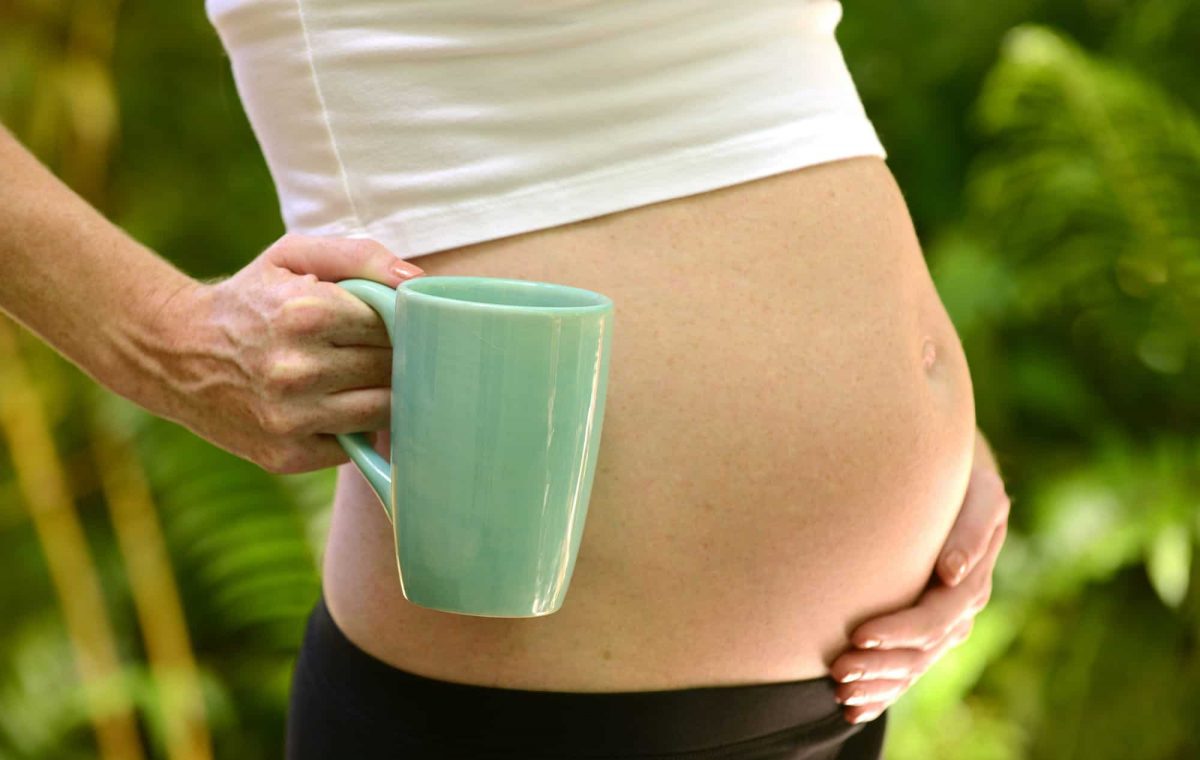Can I Drink Decaf Coffee While Pregnant?

Coffee is one of the world’s most heavily traded products. Humans love the stuff! We love it so much in fact, that we artificially flavor our drinks and food to taste like coffee. Coffee is everywhere, and it’s not disappearing anytime soon.
A beverage this popular and widespread raises some pressing questions:”‘Is it healthy?’ ‘How much is too much?’ ‘What are the long-term effects?’ ‘Can I drink this when I’m pregnant…'”
All of these inquiries are important, and we should ask them! We should especially ask these questions if the life of a baby is on the line. It’s no secret that women should stay away from certain foods or substances when pregnant.
Most studies involving coffee consumption during pregnancy revolve around caffeine intake. However in this article, we will discuss consumption of decaf coffee while pregnant.
Pregnancy is a vulnerable time. Everyone is different, so before running to your coffee pot after reading this article, consult with your doctor. Maybe coffee isn’t the right thing during your particular pregnancy.
Coffee and Pregnancy
Before we go on, know that coffee is generally healthy to drink – especially decaf (Bladyka, 2012). Without the issue of caffeine, the beverage should be okay during pregnancy.
Once again, just have a pow wow with your doctor before indulging.
The problem with modern studies
Research in the area of coffee and pregnancy can be tricky. It’s extremely difficult to pinpoint what is actually happening in the human body when conducting a study such as this. A plethora of internal and external factors can take place.
For instance, stress, health issues, demographic characteristics, and genetics can alter the results of these studies. According to Emma Bladyka’s Report on Coffee and Health, pregnant women tend to have unreliable self-reporting about risky behaviors (Bladyka, 2012; Peck, Leviton A & Cowan, 2010).
This is why many studies remain inconclusive.
But we can still learn from them.
Miscarriage and Fetal Health
We all want to get to the bottom of this coffee mystery. To do so, many tried to tackle the issues of miscarriage rate and fetal health. Coffee is generally healthy, but health areas within pregnancy remain to be discovered (Bladyka, 2012).
Here are a few studies we’ve come across that seem to be unbiased and sound.
In a population-based study of 7,855 livebirths in California’s San Joaquin Valley, women who only consumed decaffeinated coffee did not exhibit increased chance of small-for-gestational age birth, low birth weight, preterm delivery, lowered mean birth weight, or shortened mean gestational age. (Eskenazi et al., 1999).
This means that decaf would neither harm nor hurt the mother or the fetus during pregnancy.
Many studies even point out that caffeinated coffee has nothing to do with miscarriage rate and fetal death!
The New England Journal of Medicine proposed that heavy consumption of coffee has zero correlation to birth defects, low weight, or short gestation (N Engl J Med. 1982; 306:141–5.). This study even made moves to filter out demographic characteristics, health issues, and habits like smoking.
If this is the case, decaf coffee and regular coffee pose no threat to the fetus during pregnancy.
There is little sound evidence that coffee consumption leads to birth maladies of any kind… especially decaf coffee.
It appears caffeine isn’t an issue. Even if it were, decaf coffee seems to stand in the clear.
Decaf Coffee Explained
Coffee is full of caffeine. It awakens us on dreary mornings and gives us a boost after a long work day. Yet, this boost isn’t always needed. If you are caught within the clutches of caffeine, you may be rolling around in bed until the sun comes up.
Which isn’t fun.
So we humans figured out a way to take the caffeine out.
The Swiss Water Process
Most Decaf coffee is processed with the Swiss Water Method. Coffex developed this process in 1979 as a solvent free way to remove caffeine from coffee.
To do this, coffee is soaked in a green coffee extract (which is caffeine free). The caffeine in the coffee eventually seeps into the green mass, and after that, the coffee is dried and sold. The green goopy extract filters through activated charcoal and is then reused.
You keep the flavor and lose the caffeine! Simple and sustainable.
Conclusion
Reliable studies show that coffee does not harm during the pregnancy process. Even if caffeine were an issue to the pregnant woman, decaffeinated coffee would stand in the clear.
Unfortunately, we may never come to an adamant conclusion concerning coffee health, but we can take action and educate ourselves (Bladyka, 2012). So rest assured that coffee shouldn’t kill you.
And once again, talk to your doctor to see what’s best for you!
